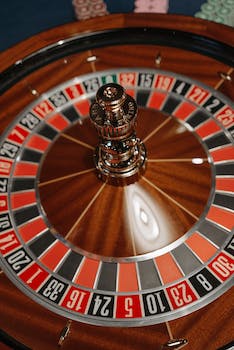Bankroll management is a crucial aspect of playing roulette smartly and staying in control of your finances. In this guide, we will explore the importance of bankroll management in roulette and provide you with essential tips to help you make informed decisions while playing. By understanding and implementing effective bankroll management strategies, you can enhance your overall roulette experience and minimize the risk of financial loss.
The Importance of Bankroll Management in Roulette
Bankroll management is the practice of setting limits on how much money you are willing to risk in a gambling session. It is a crucial aspect of responsible gambling and can help you stay in control of your finances while enjoying the excitement of the game. In roulette, where the outcome is based purely on chance, bankroll management becomes even more critical.
One of the primary reasons why bankroll management is essential in roulette is the high house edge. The house edge refers to the statistical advantage that the casino has over the players. In European roulette, for example, the house edge is approximately 2.7%. This means that, on average, the casino will win 2.7% of all bets placed. With such odds stacked against you, it is crucial to have a well-defined bankroll management strategy to minimize losses and maximize your chances of winning.
A fundamental principle of bankroll management in roulette is setting a budget. Before you even step foot in a casino or log into an online gambling platform, determine how much money you are willing to spend on roulette. This budget should be an amount that you can afford to lose without causing financial hardship. Once you have set your budget, stick to it religiously. Do not be tempted to exceed your limit, as this can lead to chasing losses and potentially spiraling into a gambling addiction.
Another important aspect of bankroll management in roulette is setting betting limits. It is crucial to determine how much you are willing to bet on each spin of the wheel. A common rule of thumb is to limit your bets to a small percentage of your overall bankroll, typically around 1-2%. This ensures that even if you experience a losing streak, you will still have enough funds to continue playing and potentially turn the tide in your favor.
Furthermore, it is essential to have a stop-loss limit in place. A stop-loss limit is the maximum amount of money you are willing to lose in a single session. Once you reach this limit, it is time to walk away and call it a day. This prevents you from chasing losses and potentially digging yourself into a deeper financial hole.
In addition to setting limits, it is also crucial to manage your emotions while playing roulette. The game can be highly unpredictable, and it is easy to get caught up in the excitement and make impulsive decisions. However, it is essential to remain calm and composed, sticking to your predetermined bankroll management strategy. Emotion-driven decisions can lead to reckless betting and significant financial losses.
Strategies for Effective Bankroll Management in Roulette
One of the most important aspects of bankroll management in roulette is setting a budget. Before sitting down at the roulette table, it is crucial to determine how much money you are willing to spend and stick to that amount. This will help you avoid overspending and ensure that you are playing within your means.
Once you have set your budget, it is essential to divide it into smaller units. This strategy is known as unit betting and helps to control your bets and minimize losses. By dividing your bankroll into units, you can determine the size of your bets based on a percentage of your total funds. This approach allows you to play for a more extended period and reduces the risk of depleting your bankroll quickly.
Another effective strategy for bankroll management in roulette is the use of stop-loss limits. A stop-loss limit is a predetermined amount of money that you are willing to lose before walking away from the table. By setting a stop-loss limit, you can protect your bankroll from significant losses and prevent yourself from chasing losses in the heat of the moment. It is crucial to stick to your stop-loss limit and resist the temptation to continue playing when you have reached it.
In addition to setting a stop-loss limit, it is equally important to establish a win goal. A win goal is the amount of money that you aim to win before quitting the game. Setting a win goal helps you stay focused and disciplined, as it gives you a clear target to work towards. Once you have reached your win goal, it is advisable to walk away from the table and celebrate your success. By doing so, you can avoid the risk of giving back your winnings and maintain control over your bankroll.
Furthermore, it is essential to choose the right roulette variant and table limits that align with your bankroll. Different roulette games have varying minimum and maximum bet limits, and it is crucial to select a table that suits your budget. Playing at a table with high minimum bets can quickly deplete your bankroll, while playing at a table with low maximum bets can limit your potential winnings. By choosing the right table limits, you can ensure that you are playing within your means and maximizing your chances of success.
Lastly, it is important to remain disciplined and avoid chasing losses. Roulette is a game of chance, and it is inevitable that you will experience both wins and losses. It is crucial to accept losses as part of the game and not let them affect your emotions or decision-making. Chasing losses by increasing your bets in an attempt to recoup your losses can be detrimental to your bankroll and lead to further losses. It is essential to stay calm, stick to your strategy, and play smart.
Tips for Playing Smart and Staying In Control in Roulette
The first tip for playing smart and staying in control in roulette is to set a budget. Before stepping foot in a casino or logging into an online gambling site, it is essential to determine how much money you are willing to spend on roulette. This budget should be an amount that you can afford to lose without causing financial hardship. By setting a budget, you are ensuring that you do not spend more money than you can afford to lose.
Once you have set a budget, the next step is to divide it into smaller units. These units will be the basis for your bets. It is recommended to divide your budget into at least 20 units. This way, you will have enough funds to play multiple rounds of roulette without depleting your entire budget in one go. By dividing your budget into smaller units, you are also minimizing the risk of losing all your money in a single bet.
Another tip for playing smart and staying in control in roulette is to determine your betting limits. This means deciding how much money you are willing to bet on each spin of the wheel. It is generally recommended to bet no more than 5% of your total budget on a single bet. By setting betting limits, you are ensuring that you do not place overly large bets that could lead to significant losses.
In addition to setting betting limits, it is also crucial to know when to walk away. Roulette can be an exciting and addictive game, and it is easy to get caught up in the thrill of the moment. However, it is essential to recognize when it is time to stop playing. If you have reached your budget limit or have been on a losing streak, it is wise to take a break and come back another time. By knowing when to walk away, you are preventing yourself from making impulsive decisions that could lead to further losses.
Lastly, it is essential to keep track of your wins and losses. By keeping a record of your gambling activities, you can analyze your performance and identify any patterns or trends. This information can help you make more informed decisions in the future and adjust your betting strategy accordingly. Additionally, keeping track of your wins and losses can also help you stay accountable to your budget and betting limits.
How to Maintain a Healthy Bankroll in Roulette
One of the first steps in bankroll management is setting a budget. Before even stepping foot in a casino or logging into an online roulette platform, players should determine how much money they are willing to spend. This budget should be an amount that they can afford to lose without causing any financial strain. By setting a budget, players can avoid the temptation to chase losses and make impulsive decisions.
Once a budget is set, it is important to divide it into smaller units. These units, also known as betting units, will determine the size of each wager. A common rule of thumb is to bet no more than 5% of the total bankroll on a single spin. This ensures that even a losing streak won’t deplete the entire bankroll in a short amount of time. By sticking to this rule, players can prolong their playing time and increase their chances of hitting a winning streak.
Another important aspect of bankroll management is knowing when to stop playing. It can be tempting to continue playing after a big win or to chase losses in hopes of recouping them. However, this can quickly lead to a depleted bankroll. Setting win and loss limits can help players stay in control. A win limit is the amount of money at which a player will stop playing after a winning session. Similarly, a loss limit is the amount of money at which a player will stop playing after a losing session. By setting these limits, players can prevent themselves from getting carried away and making irrational decisions.
In addition to setting limits, it is also important to track and analyze one’s gameplay. Keeping a record of wins and losses can provide valuable insights into one’s performance. By analyzing this data, players can identify patterns and adjust their strategies accordingly. For example, if a player consistently loses when betting on a certain number, they may decide to avoid that bet in the future. By learning from past mistakes and successes, players can make more informed decisions and improve their overall gameplay.
Lastly, it is important to remember that roulette is a game of chance. No strategy or system can guarantee consistent wins. Therefore, it is crucial to approach the game with a realistic mindset. Losing is a part of the game, and players should be prepared for it. By accepting this fact and not letting emotions dictate their decisions, players can maintain a healthy bankroll and enjoy the game for what it is.
In conclusion, bankroll management is an essential aspect of playing roulette. By setting a budget, dividing it into smaller units, and knowing when to stop playing, players can maintain a healthy bankroll and avoid financial strain. Tracking and analyzing gameplay, as well as approaching the game with a realistic mindset, are also important factors in bankroll management. By following these guidelines, players can play smart, stay in control, and enjoy the thrilling game of roulette.








